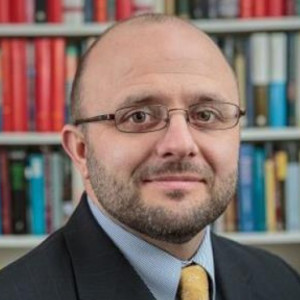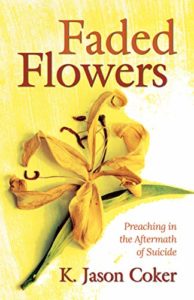In January 2009, I sat down at my desk to think about the upcoming season of Lent. I was the pastor at Wilton Baptist Church in Wilton, Conn. I had been there for just over two years but was the associate pastor for five years before that, so I knew the people in the church well and loved them (and vice versa).

Jason Coker
Although we are a Baptist church, we observe the church calendar, and Lent is always a meaningful season for us. As I contemplated what our theme should be for Lent, I felt God nudging me to the problem of pain. It seemed to me that pain would be an appropriate, although difficult, theme for a season like Lent.
Our church was not dealing with any heavy or burdensome issues, so I thought it would be a good time to work through the issues around pain during a time when few of us were actually dealing with the subject. So, off to the theological races I went.
I combed through the lectionary, chose the passages I thought were appropriate, prayed for guidance for the sermon topics, and arrived at what follows. Everything seemed to be working out. The chair of our Spiritual Growth and Discipleship Committee took out an ad in the local newspaper so the whole town could hear about this amazing new Lenten sermon series. If my mind is still working correctly, we may have even had a banner made to put in front of our church. We were poised for a “good” Lent — a reflective Lent when we could “objectively” think through a Christian response to pain.
None of us could have predicted or known what tragedy loomed in front of us. On March 1, 2009, I preached the first sermon of the Lenten series: “Defying Pain.” As you will read, the whole thrust of the sermon was to push through pain and hard-headedly do the right thing. Honestly, I felt pretty good about it!
No one ran down the aisle afterward making a public profession of a newfound faith (a hallmark of certain Baptist traditions), but it seemed good. Later that afternoon, my wife had taken our two boys on a play date and I was home alone when the phone rang. It was the chair of our Spiritual Growth and Discipleship Committee — the one who put the ads in the local newspapers.
I never had heard his voice like that before. He seemed almost out of breath. Several years before, he had some work done on his heart, but all that checked out OK, so I was worried just by the sound of his breathing. Then he spoke it out loud — he put words to his breathlessness: “Chet’s dead! You have to come. Chet’s dead, Jason. Come right now.”
Until this day, those are still the worst words I’ve ever heard. Chet, their oldest son of 19 years, the kid who was in my youth group from seventh grade on, the kid who I had eventually baptized, had taken his own life at college that afternoon.
Chet was a bright light — one of my favorite kids in a job where you are not supposed to have favorites. He got in trouble more than he should have and ended up having to spend a month in jail a couple of months before he died, but even there, he was a bright light as you will read from his short speech that he gave to our church when he was released.
We all loved Chet because he was a kid who always stuck up for the underdog. He tried to be tough and wear tough clothes and had tough friends, but down deep, Chet had one of the softest hearts someone could have. He cared for others deeply — his closest friends and family knew this.
“We were all so proud of him for coming through such a difficult experience and emerging better for it. These would be his last words to us.”
We will never know what was going through Chet’s mind, but he will never be far from our minds and certainly not far from our hearts. I lost a beloved friend; his family lost a beloved son, brother, grandson and nephew.
Chet had to spend a month in jail through December 2008 and into January 2009. During that month, his mother and father and I would visit him separately to let him know we loved him and just to check on him. One time I drove to visit him, and the correctional officer in charge of visitation that day would not let me in for no reason at all. I called the chaplain, and he told me there was nothing I could do but come back.
I visited Chet every week during his incarceration except for that week. Another time during a visit we actually sat in a room together — this was a “contact” visit. Neither of us knew if it was OK to actually touch each other, so we didn’t because we didn’t want him to get in trouble. I’ve always regretted not giving him a hug that day. We were separated by a glass window at every other visit.
When he was released, Chet told me he wanted to speak to the church and thank them for their prayers and support. This was the speech he gave during morning worship on Jan. 11, 2009. We were all so proud of him for coming through such a difficult experience and emerging better for it. These would be his last words to us.
He went back to college the next week, and seven weeks later his father called me that terrible Sunday.
Before I preached the second sermon in the series on pain, I had to preach Chet’s funeral. It is incredibly difficult to preach a funeral sermon for a young man who took his own life. The words you say will affect people for the rest of their lives. They will not forget that funeral. People came from all over the world. Former church members living in Europe came, Chet’s father’s business friends came from all over the United States, and Chet’s friends came — hundreds of them. He was wildly popular, and his friendship circle was large because he crossed all the teenage social boundaries between jocks and stoners and nerds and whatever else.
More than 400 people came to the funeral, and I knew I had to speak to all of them and every word mattered. I am grateful to George Mason, senior pastor at Wilshire Baptist Church in Dallas, who sent me a sermon outline that had all the best points in the sermon. The sermon was only part of the service, and every part was important.
Chet was a guitarist who played hard and fast punk music, so his friends told me he wanted Amazing Grace played by the Dropkick Murphys at his funeral. They told me he had just told them that weeks before. I called the youth minister at the Congregational Church to see if he would play a guitar solo during the funeral. Ken McGarry, who had been a friend of mine for nearly a decade by then and had hosted joint youth group events throughout Chet’s youth group days, was happy to play and then suggested the Dropkick Murphys rendition of Amazing Grace before I could even mention it.
“I used all the strength I had to not break down during the funeral service, and I completely forgot to ready myself for the next day.”
I broke down in tears on the spot. That was the postlude for the funeral as Chet was taken out of our church for the last time. It was Saturday, March 6, and it was beautifully bright for a New England spring day.
The next morning, I had to preach the second sermon in the series on pain. The whole week before, since that dreaded call on Sunday afternoon, I worked feverishly toward the funeral. A former intern at the church, Christine Browder, flew back to Connecticut to help with everything. She was a true godsend! We were so consumed with making sure all the people who were coming were accommodated (with hotel rooms and airport shuttles), with making sure all the food brought to the Burchetts’ house was organized so that the family wasn’t crushed by good will, with all the funeral home arrangements, food arrangements, pastoral care visits, phone calls, emails, funeral service planning, and an incredible host of other things, I nearly forgot that I had to preach the very next morning.
I used all the strength I had to not break down during the funeral service, and I completely forgot to ready myself for the next day. I didn’t realize it until I walked into the Sanctuary and stood before the church for the opening prayer. As soon as I was on the chancel looking out at the church, I began to cry. I didn’t even try to stop crying; I was just trying not to weep out loud. It took everything I had as a human being to get through that sermon: “Embracing Pain.”
 Jason Coker serves as coordinator for the Cooperative Baptist Fellowship of Mississippi. This column is adapted from the introduction to his new book, Faded Flowers: Preaching in the Aftermath of Suicide, published by Smyth & Helwys. The excerpt is used with permission from the publisher and is copyrighted material.
Jason Coker serves as coordinator for the Cooperative Baptist Fellowship of Mississippi. This column is adapted from the introduction to his new book, Faded Flowers: Preaching in the Aftermath of Suicide, published by Smyth & Helwys. The excerpt is used with permission from the publisher and is copyrighted material.
